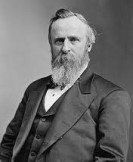
So as we head into Part III of this presidential invitation list rundown, we now have the following United States Presidents eligible for admission into the Tea Party: Millard Fillmore, Franklin Pierce, James Buchanan, Andrew Johnson, and Rutherford B. Hayes, all presidential heavy weights! So powerful were these people that they remain at or near the bottom of all rankings for US Presidents, which coincidentally, puts them at the top of the Tea Party's VIP Invitation list. Let me know which presidents you would invite to the Tea Party! Check back tomorrow for Part III of Which President Would be Invited To The Tea Party?
 RSS Feed
RSS Feed
